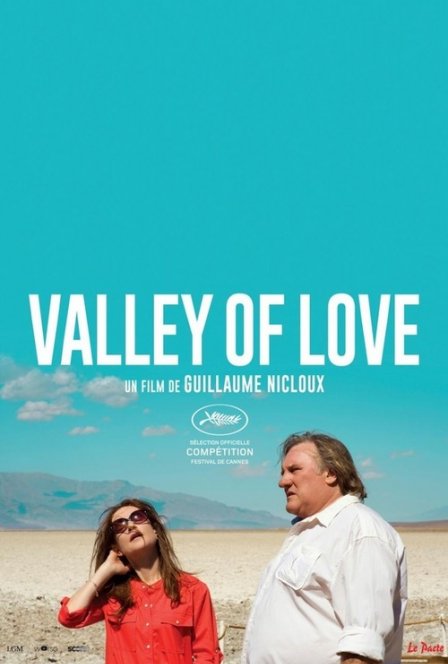The specter of death looms large throughout Valley of Love, Guillaume Nicloux’s strange yet unfulfilling drama about a divorced French couple meeting in Death Valley at the behest of their deceased son who recently committed suicide. Isabelle and Gerard, played effectively by French acting giants Isabelle Huppert and Gerard Depardieu, each received a mysterious letter from their son, Michael, requesting they meet in Death Valley and go to a remote location at a specific time where he will deliver them a message. These potentially supernatural elements are held at bay until the final act while the meat of the film is regrettably devoted to the duo’s quarreling over unresolved marital issues and tending to the fresh wounds of their loss.
The reasons behind Michael’s suicide are left unclear — hinted at with brief mentions of his homosexuality, his estrangement from his parents, particularly his mother who has not talked to him in seven years, and emigrated to Death Valley alone for a time — but ultimately it serves as a mere prop to get Isabelle and Gerard together to both exorcise their demons and test their collective faith. While there are moments of tenderness and explosiveness between the two that that suggest both a true love in the past and bitter resentment in the present, these feelings are explored on such a superficial level and their interpersonal conflicts remain petty in the face of the situation that faces them. It’s confounding as to why the stakes remain so low for so long.
The disconnect between the gravity of having a loved one commit suicide and the relative mundanity of Isabelle and Gerard’s conversations for much of the film leaves the audience in a similar purgatory as the parents who follow instructions and wait for the penultimate moment of their son’s promised return. Yet this stretch of the film creates no sense of psychological tension or complexity, choosing instead to meander through aimless arguments and pointless encounters with tourists. Most of these encounters occur with obnoxious Americans either butting into conversations, cursing at a football game at a bar or giving Gerard, who is a well-known actor, a hard time for not adequately stroking the ego of his fans. The first such meeting, where Gerard signs “Bob De Niro” in a book of a man who can’t remember his name or anything he’s acted in garners a chuckle, but it also feels woefully out of place with the rest of film. Had its point been to show callous Isabelle and Gerard are, these scenes may have served a function, but they are both deeply affected by their son’s death so they come off as simply broad and puerile jabs at insufferable Americans.
As weak as Valley of Love is for much of its first hour, its final act, where the two characters are confronted with the reality of their son’s request and Gerard’s revelation about his own personal health, is at least more palatable. To some degree, the pettiness earlier on could be read as a coping mechanism to avoid confronting the fantastical idea that their dead son would appear in the middle of the desert, although they do remain keenly aware of that fact throughout. And yet with this bizarre potential right around the corner, the two never discuss anything about the afterlife (spirituality is briefly mentioned near the end, but is quickly dropped after Gerard expresses disinterest) or why Michael may have chosen to contact them this way. Nicloux allows the expansive desert to reflect their emotional stasis yet aside from a few striking images, the film never achieves a true sense of visual congruity or poetry.
The finale is predictably ambiguous and underwhelming no matter what interpretation it’s given. It provides a sense of closure to Isabelle and Gerard’s relationship, but that closure is hurried and mostly unearned, merely absolving them of all responsibility for their son’s decision. Huppert and Depardieu play it almost powerfully enough to pull it off, but the absence of any backstory to their prior issues, why Isabelle was estranged from her son or what their feelings were towards their son’s request, make what is meant to be a transcendent, mysterious event feel forced and hollow. Whether it is seen as an act of delusion or of faith, it registers as a cheap shortcut to profundity, a potentially fascinating mystical gesture that confuses spiritual vagaries with philosophical depth.

